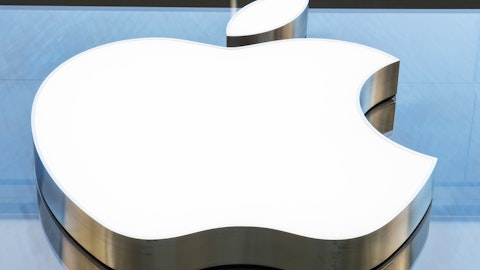After collating the 13F filings submitted by hedge funds for the period ended March 31, 2015, a lot of details have been unearthed, some of which cannot be readily noticed by simply looking at the figures relating to individual hedge funds. We noticed a number of similarities between the positions held by Stephen Mandel‘s Lone Pine Capital and John Armitage’s Egerton Capital Limited. The latest 13F filings of both funds showed a focus on services stocks and both had long positions in 14 stocks as of the end of March. To provide a more helpful overview, let’s take a look at Mastercard Inc (NYSE:MA), Baidu Inc (ADR) (NASDAQ:BIDU), Priceline Group Inc (NASDAQ:PCLN), and Apple Inc. (NASDAQ:AAPL), which are some of the most important companies in which Lone Pine and Egerton held stakes.

Why are we interested in the 13F filings of a select group of hedge funds? We use these filings to determine the top 15 small-cap stocks held by these elite funds based on 16 years of research that showed their top small-cap picks are much more profitable than both their large-cap stocks and the broader market as a whole. These small-cap stocks beat the S&P 500 Total Return Index by an average of nearly one percentage point per month in our back tests, which were conducted over the period of 1999 to 2012. Moreover, since the beginning of forward testing from August 2012, the strategy worked just as our research predicted, outperforming the market every year and returning 144% over the last 32 months, which is more than 84 percentage points higher than the returns of the S&P 500 ETF (SPY) (see more details).
Follow Stephen Frank Mandel Jr.'s Lone Pine Capital
At the end of the quarter, both Lone Pine Capital and Egerton Capital Limited cut their stakes in Mastercard Inc (NYSE:MA). Mandel reduced his position by 36% over the quarter to 12.97 million shares valued at $1.12 billion, while Armitage cut his stake by 35% to 4.18 million shares valued at $361.13 million. Interestingly enough, both funds increased their stakes in Mastercard by almost a similar percentage during the fourth quarter of 2014. Moreover, the investors’ positions in Mastercard Inc (NYSE:MA) amass almost the same percentage of their equity portfolio (Lone Pine – 4.24% and Egerton – 4.94%). The company is a global payment services corporation with its headquarters in Purchase, New York. Mastercard’s 43.15% return on investment for the past 12 months beat the industry average of 9.41%, according to Reuters’ data. While many U.S. citizens might feel cautious going into debts, especially after the Great Recession, there is every reason to believe that credit card companies will continue to surge forward.
In April this year, revolving credit, mainly representing credit-card debt, had a one-year climb of 11.57%, which shows that shoppers haven’t refrained from swiping their cards. That is good news for credit companies like Mastercard. At the end of the first quarter of 2015, Lone Pine Capital remained the largest shareholder with 12.97 million shares, followed by Tom Russo‘s Gardner Russo & Gardner with 10.02 million shares and billionaire Andreas Halvorsen’s Viking Global, which owns 8.26 million shares.
Baidu Inc (ADR) (NASDAQ:BIDU) is another company in which both Mandel and Armitage held long positions at the end of the first quarter. While Mandel reduced his position in the company by 25%, Armitage increased his by only 4% to 5.28 million shares and 1.69 million shares respectively. The Chinese web services company has been a major attraction for many U.S. investors. Cody Willard, a former hedge fund manager, made a comment earlier this year that Baidu is one of the best ways to invest in China. Even after reducing his position, Mandel still remained the largest shareholder, followed by Philippe Laffont‘s Coatue Management with 3.02 million shares and billionaire Andreas Halvorsen’s Viking Global with 2.43 million shares.
Let’s now consider Priceline Group Inc (NASDAQ:PCLN) in which Mandel held 1.33 million shares with a value of $1.55 billion and Armitage disclosed owning 219,910 shares valued at $256.01 million after increasing his stake by 46.00%. Priceline is an American online company that claims to help users to take advantage of discounts on purchases related to travel such as airline tickets and hotel bookings. To gain advantage in the Chinese market, the company recently announced that it will pump in an additional $250 million into Ctrip, a Chinese online travel leader. The move could earn the American company up to 15% stake in Ctrip.com International, Ltd. (ADR) (NASDAQ:CTRP), which is considered its biggest competitor in Asia-Pacific. The move to up its stake is timely since online booking in China is expected to hit $30.30 billion this year, up from $14.00 billion in 2012. Other funds that had stakes in Priceline Group Inc (NASDAQ:PCLN) at the end of the first quarter include Eric W. Mandelblatt‘s Soroban Capital Partners and billionaire Chase Coleman’s Tiger Global Management LLC.
Lastly, let’s look at Apple Inc. (NASDAQ:AAPL), which ranks among the most popular among the stocks we track. Mandel held 6.84 million shares of the company valued at $850.92 million and Armitage closed the quarter with 3.93 million shares valued at $488.65 million. Both funds increased their positions in the Cupertino, California-based technology company with Mandel raising his stake by over 200% and Armitage upping his position by 9% on the quarter. Apple Inc. (NASDAQ:AAPL)’s stock has registered a growth of more than 15% this year, owing to its record breaking sales of its new iPhones. There has been a particular interest in the large screen iPhones from China, a market that is expected to help boost the iPhone sales to more than 50 million units in the current quarter. Apple Inc. (NASDAQ:AAPL) has also set out to take control of the wearable market with its Apple Watch, which is believed to have hit 2.80 million in sales in the U.S. alone, barely two months of hitting the market. A few of the funds that were invested in the stock at the end of March were billionaire Carl Icahn‘s Icahn Capital LP and billionaire Ken Fisher’s Fisher Asset Management.
Disclosure: None





